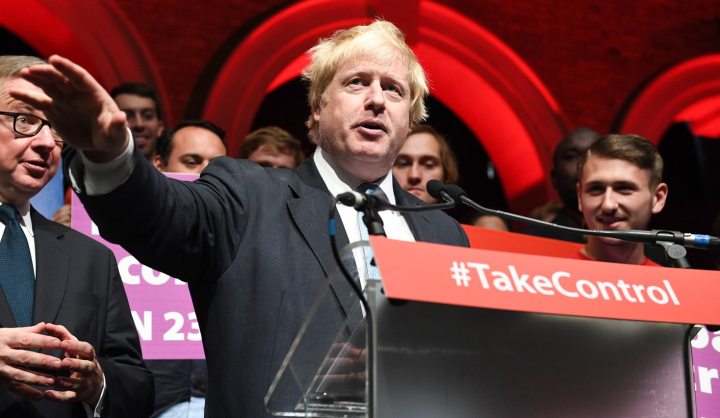World
Great Britain: The Brexit Vote looms large and dangerous

Readers could be forgiven for not paying enough attention to the upcoming British Brexit vote over its membership in the EU, what with the seeming chaos of the impending American presidential election, South Africa’s own upcoming local elections, continuing warfare in many parts of the Middle East, and a host of other global concerns. Nevertheless, the Brexit vote will take place this week, and, if one listens to those who advocate staying in the EU, a vote to leave will unleash a great wave of economic danger and disaster. J. BROOKS SPECTOR takes a look.
Up until Thursday of last week, the lead-up to Britain’s Brexit (departure from membership in the European Union) referendum vote had been settling into an increasingly heated but largely rhetorical Ping-Pong match. Proponents of a British exit from the EU were embracing the complaints of many British people that membership in the EU was creating a wide-open superhighway for hordes of foreigners to enter – and stay. An exit strategy would finally slam the door shut on that migration and it would be a way to recover hallowed British traditions of freedom, democracy and sovereignty from a stultifying EU bureaucracy that had its hand in everything, right down to the shape of fruits and vegetables offered for sale in stores. Opponents of that departure were largely hanging their arguments on the expected massive economic whack on Britain that such a decision would guarantee.
Then came the assassination of freshman Labour MP Jo Cox by Thomas Mair. The MP had been standing just outside the building where she had been carrying out her “surgery” – or constituency meeting – listening to complaints and problems from some of her constituents in Birstall in West Yorkshire, near Leeds. Her tragic death at the hand of a man presumably supporting a “remain” vote, but given to some wild, raving statements, was the first murder of a British MP in a quarter century. It immediately put a more sombre face on the upcoming vote – rather than merely the increasingly sour texture it already had achieved. So startling was her death that it led both the pro and anti camps to declare a ceasefire in their campaigning right through Sunday, just days before the actual vote was scheduled to take place on 23 June.
Even before Cox’s death, polling data was indicating a Brexit vote might well win when the ballots were counted. While survey data has moved about widely since campaigning on the referendum began, in recent days it has swung increasingly towards an exit, although Britain’s bookies are reported to believe a “remain” vote will – ultimately – capture the day. (Still, electoral prognosticators in the UK are probably remembering with a certain degree of humility their inability to predict with any real accuracy the results of the last parliamentary election.)

Photo: Members of the public cry while looking at floral tributes left in memory of British Member of Parliament Jo Cox in Parliament Square, central London, Britain, 17 June 2016. Jo Cox was reported dead at the hospital in Leeds after being shot and critically injured in Birstall on 16 June. Cox was airlifted from the attack scene to a hospital in Leeds where she later died. Cox had in recent weeks campaigned for the Remain camp. Britons will vote on whether or not they want remain in the EU on 23 June. EPA/HANNAH MCKAY
Unlike many, perhaps most political disagreements in the UK, the Brexit referendum has transcended party allegiances as many Conservatives are supporting it, such as the flamboyant former London Mayor Boris Johnson, even as Prime Minister David Cameron has consistently opposed exiting the EU, along with leaders of the Labour and Scottish National Parties. However, given the support for Brexit on the part of a big chunk of the Conservative Party, as the AP concluded it its wrap-up of the Brexit debate, “In calling a referendum on Britain’s membership in the European Union, Cameron has made a gamble that could end his career — and take his country out of an international alliance it joined more than 40 years ago. It would be a rare but fateful miscalculation for a politician who has a reputation for thriving under pressure and astutely judging political risks. ‘I think he’s actually been pretty stunned by the strength of the “leave cause”,’ said Cameron biographer James Hanning. ‘The golden rule is, never hold a referendum unless you’re confident of winning it, and I think he thought that the moderate voices would prevail by some distance. But that’s not the way the polls are suggesting it’s going to go.’ The referendum campaign has been unexpectedly bitter and divisive, and was brought to a shocked halt when Labour lawmaker Jo Cox was shot and stabbed to death in the street last week. The suspected killer gave his name in court as ‘death to traitors, freedom for Britain’.”
In fact, when Cameron first promised a referendum on EU membership three years ago, he had said then that he would make a new deal between his nation and the EU – a deal that would prove continued membership would be the attractive alternative for the UK. He initially gained concessions from the EU regarding British welfare benefits designed to lessen the attraction of the UK as a destination for immigrants and an exemption from that highly loaded EU pledge of forging an “ever-closer union”. This is a phrase that seems to stick in the craw of more than a few British voters. It apparently subliminally channels images of all those efforts over millennia, by an unrelenting succession of European powers, to conquer Britain – from Rome’s legions, right through to Spain’s Armada, Napoleon’s dreams and Hitler’s Germany. Moreover, a major core of voters have come to be thoroughly resistant to the prime minister’s message the UK is a stronger, safer, more economically secure nation within the EU than outside of it.
What seems key to many UK voters’ concerns, beyond anything else, is the immigration issue. (Immigration has become a litmus test issue for a growing number of British voters.) Brexit supporters have largely dismissed the concessions Prime Minister Cameron says he has gained from his EU partner nations as being virtually meaningless. They argue these concessions can do little to limit immigration from all those other EU nations (notably those Polish plumbers and bricklayers that are already the stuff of British legend), precisely because the EU still guarantees free movement among its respective member states. This speaks to many voters who have been unhappy witnesses to the many thousands of Europeans who have come to the UK in the past decade – especially from those new EU members from among the former Warsaw Pact nations. (Not surprisingly, the potentially altered circumstances of the hundreds of thousands of Britons who now live in other EU nations should the Brexit go forward has gotten rather less notice by voters.)
Paradoxically, instead of bringing together the various factions among the Tories, something that was a reason for the Cameron referendum pledge in the first place, the upcoming vote has simply made things worse for his government as all those Eurosceptic members of the PM’s cabinet have also been calling for a “leave” vote, like all the other Eurosceptics. Along the way, key “Brexit-eers” Boris Johnson and Justice Secretary Michael Gove have spent the past several months vociferously attacking Cameron over his support for continued membership. Still, Cameron gamely insists he will stay on as prime minister, even if the population votes for the UK to depart from the EU.
He recently told the BBC that if his side were defeated, he would “construct a government that includes all of the talents of the Conservative Party”. But smart money is increasingly saying he would have no choice but to tender his resignation as prime minister and party leader, making way for a senior pro-Brexit campaign leader, such as, inevitably, Boris Johnson.
And even if the UK does vote against a Brexit, Cameron’s long-term prospects to stay in office will begin to close down anyway. Most likely, a deeply divided party would want him out of the way to get the party’s fissures healed before an election in 2020. With these calculations in mind, British observers are already speaking about how Cameron will want to position his legacy. University of London politics professor Tim Bale explained to the media, for example, that Cameron would have hoped to be remembered for restoring the economy after the 2008 financial crisis and for social reforms such as legalising same-sex marriage. And, yes, as Bale explained, “I think gay marriage will still be an important one. But, unfortunately, I think he’s going to be remembered in the history books as the prime minister who took us out of Europe.” That could have something of the same impact as the way Tony Blair’s reputational damage from joining in the American-led invasion of Iraq in 2003, some observers are already opining.
But would a Brexit decision actually be good or bad for Britain? Aside from the fact the referendum would not mean an immediate end to British membership in the group, just like that, instead it would give the government a two-year window to negotiate the terms of the withdrawal. For Brexit supporters, that crucial period would allow Britain to reach the kinds of accommodations that, say, Norway has already done, and to sort out the potentially damaging impact a departure would have on trade and travel between Ireland and Northern Ireland. The fact that Norway still is bound by many of the decisions of those dreaded, faceless Eurocrats in Brussels, and that Norway continues to make an outsized contribution to the EU’s funding, has largely gone unrecognised by Brexit supporters, however. Meanwhile, opponents of the Brexit have been forecasting almost immediate gloom, doom, and more than a touch of Armageddon for the British economy – if the vote goes for a Brexit. To some degree, of course, no one actually knows because no major nation has ever tried to depart from the EU – so far.
In judging the costs and consequences, The Economist argued in its edition published just before the referendum takes place, “The peevishness of the campaigning has obscured the importance of what is at stake. A vote to quit the European Union on June 23rd, which polls say is a growing possibility, would do grave and lasting harm to the politics and economy of Britain. The loss of one of the EU’s biggest members would gouge a deep wound in the rest of Europe. And, with the likes of Donald Trump and Marine Le Pen fuelling economic nationalism and xenophobia, it would mark a defeat for the liberal order that has underpinned the West’s prosperity.”
The paper noted that Brexit supporters argue a departure is all about liberation and history, as well as economic liberalism. “They sign up to the argument that free trade leads to prosperity. They make the right noises about small government and red tape. They say that their rejection of unlimited EU migration stems not from xenophobia so much as a desire to pick people with the most to offer.
“The liberal Leavers are peddling an illusion. On contact with the reality of Brexit, their plans will fall apart. If Britain leaves the EU, it is likely to end up poorer, less open and less innovative. Far from reclaiming its global outlook, it will become less influential and more parochial. And without Britain, all of Europe would be worse off.
“Start with the economy. Even those voting Leave accept that there will be short-term damage. More important, Britain is unlikely to thrive in the longer run either. Almost half of its exports go to Europe. Access to the single market is vital for the City (the global financial hub in London) and to attract foreign direct investment. Yet to maintain that access, Britain will have to observe EU regulations, contribute to the budget and accept the free movement of people – the very things that Leave says it must avoid. To pretend otherwise is to mislead.”
The Economist went on to conclude, “…The most corrosive of these illusions is that the EU is run by unaccountable bureaucrats who trample on Britain’s sovereignty as they plot a superstate. As our essay explains, the EU is too often seen through the prism of a short period of intense integration in the 1980s – which laid down plans for, among other things, the single market and the euro. In reality, Brussels is dominated by governments who guard their power jealously. Making them more accountable is an argument about democracy, not sovereignty. The answer is not to storm out but to stay and work to create the Europe that Britain wants.”
Already, seemingly to brace themselves and their nations for Britain’s likely Brexit vote, a growing chorus of foreign leaders have been voicing their strong disagreement with such a possibility. Two months ago, Barack Obama had said, “The US and the world need your outsized influence to continue – including within Europe.” And Shinzo Abe, the Japanese prime minister, chipped in at around the same time, “A vote to leave would make the UK a less attractive destination for Japanese investment.” Not surprisingly, the German, French and Italian leaders have all weighed strongly to argue for continued membership. Just as expectedly, however, coming in from the economic nationalist clique, French National Front leader Marine Le Pen and Donald Trump gave their respective thumbs down on the idea. Le Pen said, “It is possible to live outside the EU. One is free or one is not.” And Trump offered, “I know Great Britain very well… I would say they’re better off without it.”
But most important of all, perhaps, as the looming possibility of a Brexit swings into view, stock markets will wobble, investments throughout Europe (including the UK) will tremble, and the British pound seems likely to continue its recent declines. Or as the Wall Street Journal wrote the other day, “ ‘The fear is immense,’ said Axel Schäfer, a German centre-left lawmaker who specialises in European affairs. Referring to next Thursday’s vote in Britain, he added, ‘I have never been this unsure about an outcome.’ After months focused on the refugee crisis, the political and media establishment now suddenly sees a ‘Leave’ vote as the development that could irrevocably change the post-World War II order in which Germany has prospered. ‘Sometimes you know something is about to happen that has the potential to change our world,’ German magazine Der Spiegel said in its lead editorial earlier this month – an issue headlined, in German and English, ‘Please Don’t Go.’ ”
And, over the weekend, focusing on the immediate economic and financial dislocations a Brexit could produce, The Washington Post noted, “Britain’s departure from the European Union could send shock waves across the global economy and threaten more than a trillion dollars in investment and trade with the United States. International policymakers are ramping up their warnings of the dangers of a British exit – popularly known as ‘Brexit’ – from the political and economic alliance that has united Europe for the past four decades. Voters in Britain will decide whether to leave or remain in the European Union in a referendum on Thursday, but financial market volatility has already spiked as polls show a growing desire to abandon the partnership.
“The decision carries hefty consequences for American businesses, which employ more than a million people in Britain. The United States is the largest single investor in Britain, and many firms consider it the gateway to free trade with the 28 nations that make up the EU. Brexit would jeopardise their access to those markets, potentially reducing revenue and forcing some firms to consider relocating their European operations elsewhere. That has put corporate America onto the front lines of the campaign to keep the union together, with several of Wall Street’s biggest names donating substantial sums to the effort.
“A Brexit would be ‘bad for the UK, it would be bad for Europe, it would be bad for the world, including the United States,’ Angel Gurría, secretary general of the Organisation for Economic Co-operation and Development, said in an interview. ‘You already have enough uncertainty in the world today. We don’t need more.’ The International Monetary Fund on Friday issued one of the most dire forecasts to date, calling the impact of Britain’s departure from the European Union ‘negative and substantial’. The fund predicted that a Brexit could reduce economic growth by up to 5.6% over the next three years in its worst-case scenario. The gloomy outlook is driven by an expected sharp decline in the pound and severe disruptions in trade as the nation is forced to renegotiate deals with countries across the continent, potentially on worse terms.”
But seemingly regardless of these growing uncertainties and the dolorous thoughts from forecasters (sans folks like Trump and Le Pen), British voters appear increasingly likely to be swayed by appeals to the historical magic of Britain as an island that is not part of the main (with apologies to John Donne), as well as the promise that an exit from the EU will hold back all those immigrants and cut back down to size all those wily Eurocrats hiding in Brussels with their oppressive load of continent-wide regulations. We shall know, soon enough. DM
Main photo: British Member of the Parliament and former London Mayor Boris Johnson attends a Vote Leave rally in London, Britain, 19 June 2016. Johnson is a key figure in the Vote Leave campaign in the upcoming EU Referendum where Britons will vote to either stay or leave the European Union on 23 June. EPA/STR


















 Become an Insider
Become an Insider